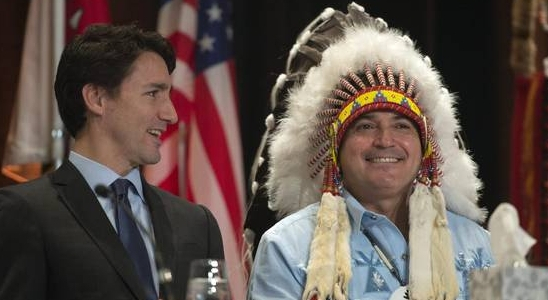Promises
Trudeau’s promises to aboriginal people feared to be unachievable

Justin Trudeau has made some big promises to Canada’s indigenous peoples, and the head of the Assembly of First Nations says he is anxious to get working with the incoming Liberal government to see those commitments realized.
But critics say some of the goals that Mr. Trudeau has set for himself as he tries to improve the lot of the country’s aboriginal people are impractical, wrong-headed or simply beyond his ability to deliver.
Mr. Trudeau – during a virtual town hall last week aired by APTN, Canada’s indigenous television network – said he would repeal or reform many pieces of legislation that do not respect the rights of indigenous peoples, including their right to be adequately consulted about issues that affect them. He also said he would give the First Nations a veto over development in their territories.
Mr. Trudeau promised last spring to implement all 94 recommendations of the Truth and Reconciliation Commission (TRC) on indigenous residential schools, many of which are far-reaching. And, during the recent election campaign, he said he would increase the funding for First Nations schools by an amount that far exceeds the $1.4-billion over three years that was allocated but never delivered by the Conservatives.
Perry Bellegarde, the National Chief of the Assembly of First Nations, said in a telephone interview on Thursday that Mr. Trudeau’s statements have been “very powerful” and he is “on the path towards reconciliation.”
It is critical, Mr. Bellegarde said, to review and possibly repeal legislation passed by the Conservative government – especially a controversial anti-terror law and massive budget bills that rewrote environmental legislation. “We need to get working on that as soon as possible,” he said.
Allowing indigenous groups to veto development in their territories would meet the duty to consult that is required of signatories to the UN Declaration on the Rights of Indigenous Peoples, Mr. Bellegarde said. “We want job creation and wealth creation,” he said, “but not at the expense of hurting the land and the water.”
The recommendations of the TRC were “all about closing the gap and making a difference in the quality of life in Canada,” the National Chief said. And more money for education, he said, would eliminate the disparity that the AFN says exists between the the per-student funding for indigenous children and that provided to other Canadian kids.
Neither the Liberals nor the Conservatives responded Thursday to questions about the new government’s aboriginal policies.
But Ravina Bains, the associate director for the centre for aboriginal policy studies at the Fraser Institute, said the problem with on-reserve schools has been a lack of standards, not money. If the organization of reserve schools is broken, she said, “providing more funding isn’t going to help solve the problem.”
And giving First Nations a veto over development in their territories would create uncertainty for resource companies which would, in turn, make it more difficult for those First Nations who want to take advantage of their resource wealth to reap the benefits, said Ms. Bains.
Tom Flanagan, a former senior adviser to outgoing Conservative Prime Minister Stephen Harper and a professor at the University of Calgary, where he has studied aboriginal land claims and property rights, said he finds Mr. Trudeau’s proposals to be “alarming” and some to be unachievable.
“How can you enact the 94 recommendations of the Truth and Reconciliation Commission?” he asked, pointing out that many are beyond federal purview. “One of them is that the Pope should apologize for residential schools.”
On the promise to repeal or revise legislation that does not respect indigenous rights or has not received adequate indigenous consultation, Prof. Flanagan said the extent of the government’s duty to consult is unclear. And some of the legislation that chiefs say was imposed upon them, including the law that requires them to post financial information about their governments, has been important, he said.
On the promise of a veto of development on indigenous lands, he said, the First Nations already have a veto over what happens on reserves. But if Mr. Trudeau meant the broader traditional territories, said Prof. Flanagan, the Canadian courts have never said the right to be consulted implies a veto.
The Supreme Court “has always wanted to preserve something that is kind of like an eminent domain of government to act in the public interest, if necessary,” he said, adding that to throw that away is “reckless.”
Prof. Flanagan noted that the promises were made by Mr. Trudeau during an election campaign. “There is a difference between stagecraft and statecraft,” he said. But the Liberals were successful in garnering a large portion of the aboriginal vote, and “those voters are going to demand something in return.”
